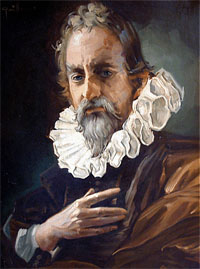Michael Servetus 500th Anniversary
|
|
This post was updated on .
An International Conference in Honor of the
500th Anniversary of the birth of Michael Servetus September 16-18, 2011 San Diego, California http://reason.sdsu.edu  Background Intellectually, the West has seen the development of a modern community of persons who profess to have no religious faith and to have no need of a deity to complete their understanding of the world and the cosmos. That community can trace its origins to the sixteenth century, at which time the pan-European Roman Catholic establishment was challenged by Protestantism. The intellectual world of Christian orthodoxy which had dominated Western thought for a millennium was shaken to its foundations by the rise of philosophical unbelief. ... ...In the twentieth century, the evolving Unitarian Universalist movement would nurture an innovative form of unbelief, Humanism, a new type of the religious life that self-consciously abandoned all supernaturalism while maintaining many of the functions traditionally served by religion, namely, guiding morals and ethics, forming of a comprehensive worldview, building community, and ritualizing and celebrating the major life-cycle events (birth, coming of age, marriage, death, and so on). ... Michael Servetus ...His death transformed the history of Europe in at least four significant ways: 1 Anti-Trinitarianism arose within Christianity leading eventually to the birth of Unitarianism, rational religion, and atheism. 2 A rationalistic approach to interpreting the Bible arose, which allowed scholars and others to read the text within its historical, social, and cultural contexts. 3 A belief in religious liberty, freedom of thought, conscience, and speech arose. 4 The concept of religious toleration arose. Sebastian Castellio wrote the best epitaph for Michael Servetus when he said: "To kill a man is not to defend a doctrine, but simply to kill a man." 米格爾·塞爾韋特(维基百科) 儘管加爾文認為塞爾韋特因為其「惡劣的瀆神言論」被處死是罪有應得,然而他希望使用更為仁慈的方式而非火刑。...塞爾韋特因否定三位一體和嬰兒洗禮的罪名被判處火刑。加爾文要求將火刑改為用劍處決,被...指責為過分寬容。1553年10月27日,米格爾·塞爾韋特在日內瓦郊外被處以火刑。 由於塞爾韋特拒絕三位一體並因此被當成異端燒死,他被認為是單一神派 (Unitarians) 的第一個殉道者。後來,單一神派與普救派 (Universalists) 合併成為現代的一神普救派 (Unitarian Universalism),其中單一神派發生了重大改變,塞爾韋特的觀點已經與現在的教義不十分相關了。一些學者認為他的觀點更接近撒伯流主義或阿里烏斯教,更或者他自成一派。無論如何,美國一神普救派的教堂還是因為他而以「塞爾韋特」命名。 米迦勒 ‧ 塞爾維特紀念碑 1903年10月27日,即塞爾維特350周年忌日,日內瓦的加爾文教徒們受到良心的驅使,在他當年被行刑的 Champel 地區,如今是一家醫院的草地上,建立了一個贖罪紀念碑。 「我們滿懷尊敬和感恩 偉大改革者加爾文的後代 譴責他的一個錯誤 一個他那時代的錯誤 為了思想的自由 也為了改革運動和福音的原則 我們樹立這座贖罪紀念碑 1903年10月27日」 誠如宗教史家羅蘭.H.貝特恩 (Roland H. Bainton) 所言,「賽爾維特聲名獨特之處在于天主教徒只燒毀他的畫像,而新教徒燒死了他本人」。賽爾維特也是第一個被改革後的教會當局以異端之名處死的人。他的殉難比 16 世紀其他任何人因宗教而死具有更大的意義,因為賽爾維特之死標誌著新教內部對宗教寬容問題的第一次重要辯論。 許多人對處死賽爾維特一事表示反感,這激起了一場討論宗教寬恕的運動,這場運動在塞巴斯蒂安 (Sebastian Castellio) 在 1554 寫作的捍衛宗教寬容的著作《論異端及其受到的待遇》(Concerning Heretics) 中得到了集中體現。 Alex's comment: Salute to Michael Servetus, a martyr of freedom of conscience!  塞爾維特冥壽五百週年。景仰塞爾維特!他是良心自由的殉道者! 
|
«
Return to International UU 國際UU消息
|
1 view|%1 views
| Free forum by Nabble | Edit this page |

